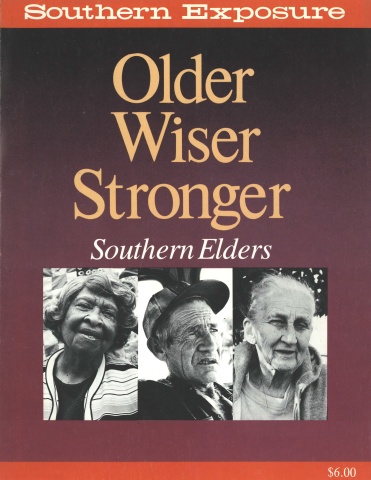Facing South: "We're all going to get old, so we better learn to deal with it."

This article originally appeared in Southern Exposure Vol. 13 No. 2/3, "Older Wiser Stronger: Southern Elders." Find more from that issue here.
WAGENER, SC — Josephine Matthews never raises her voice, no matter what level of confusion surrounds her. Tall, straight, and sparse, she can part a crowd with her shoulders, but her power is more than physical. She has presence — a calm, matter-of-fact dignity that moves people into sudden silence, awaiting her words.
At 87, "Miss Jo," as she prefers to be called, has a lot that's worth hearing. She can reminisce for hours about her 43 years as a midwife in Wagener, her hometown farming community far from medical facilities. Though she and her late husband had no children, "I've got children all over this country," she says. Her voice dips low as she laughs, leaning on the kitchen table in her home. It's mid-afternoon, and the shouts of children drift through the window behind her as they hurry home from school.
"I birthed whole families and helped bring 1,500 babies into this world, all healthy. I never lost one, and I never lost one of my mothers, not one.
"I was proud of my work, I was known and appreciated," she says, pressing one palm on the table. "Yes, proud to be a midwife — they've been here almost as long as the prophets. I'm a third-generation one, too."
Her hands rest on the black medical bag in her lap, brought from the closet earlier that day. Since her retirement eight years ago, midwifery has become something Miss Jo dusts off and handles only when asked. "It was time for new things," she explains, her face un folding with excitement. "Yes, new."
Nowadays, she speaks for the senior citizens of Wagener, focusing on their particular problems, offering possible solutions. As an executive member of the Aiken Area Council on Aging, she's close to those problems — very close. She has been working with the board of directors for 13 years and was instrumental in locating a congregate meals site in Wagener in 1975.
"I know, I know," she laughs, leaning forward on the table. "I skipped the middle and went from the first to the last. Well, as a senior, I can say seniors are more trouble than babies. And smarter."
From 1977 to 1982 the Aiken Area Council on Aging employed Miss Jo in its Green Thumb organization, a Department of Labor program funded by the Older Americans Act, which paid her for her Meals on Wheels work. Every morning, Miss Jo traveled to a congregate meals site, loaded her car with hot lunches, and distributed them to eight area homebound seniors "who were so lonely, some of them," she says. Her eyebrows rise, an index finger goes up. "Why they'd rather have had a talk than a meal most of the time, so I'd chat with 'em. Rich or poor, money can't hold a conversation. You need people to participate."
Health problems have severed Miss Jo's employment ties but not her personal ones. She tends to friends, neighbors, and family just as she always has, though her pace has slowed a little. At 65, she welcomed her sister's seven grandchildren into her home and reared them as her own. Her selfless philosophy has earned Miss Jo civic and state awards — as the 1974 Outstanding Older American for South Carolina and the South Carolina Woman of the Year — as well as a high school diploma at age 74.
She enrolled in an adult education program because "they needed more students in order to offer the courses." She leans back, laughing, and the afternoon sun blazes on her iron gray hair. "Young boys, drop-outs, saw me going to school and said 'If that old lady can do it, I can, too.' So they joined."
She talks about church raffles and scholarships in a steady, low voice that indicates the seriousness of her purpose. She has worked with fellow members of Sharon Baptist Church on shoe festivals ($1 plus your shoe size) and weigh-ins (5c per pound), raising money for college-bound youngsters in the church.
Her motivation keeps her moving from one community project to the next — and she still helps make Council on Aging policy decisions.
"We have a duty to older citizens in this country. They helped build it," she says quietly. "We're all going to get old, so we better learn to deal with it while we're able. The thing to do is to keep moving. A person who stops activities will deteriorate."
Her chin tilts down and she folds her thoughts into her hands, silent. An occasional car passes outside the window. Miss Jo has never traveled more than 50 miles from Wagener, but perhaps she didn't have to — she shaped her world and her function in it a long time ago, and that creative process has never stopped.
Tags
Rebecca McCarthy
Rebecca McCarthy is a freelance writer in Athens, Georgia. (1985)